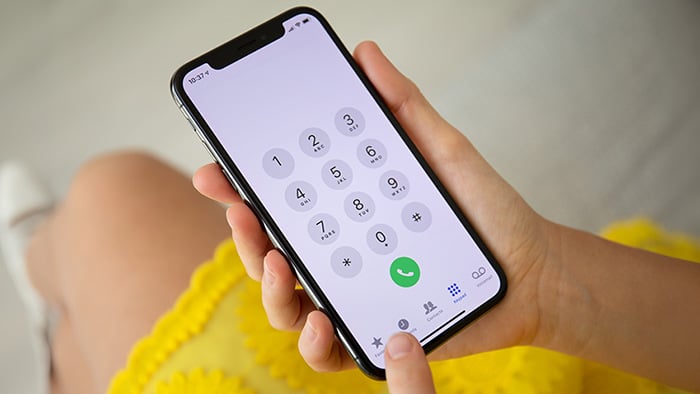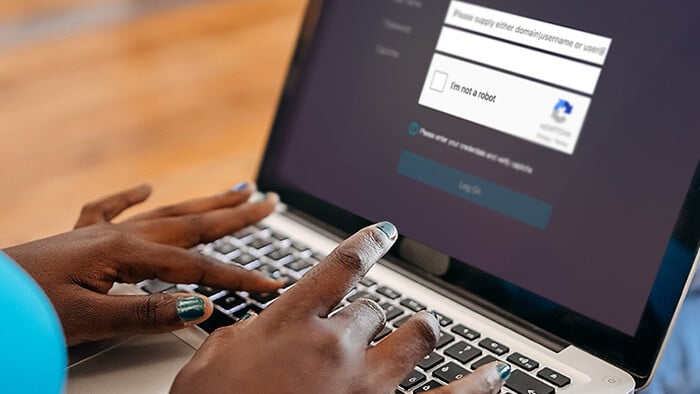10 signs your phone is hacked
Cybercriminals and hackers are always refining their attacks — making it increasingly difficult to tell when you’ve been hacked. Attackers can even remotely deactivate your phone, and they can trade stolen info on the dark web, leading to identity theft. Thankfully, there are clear phone hacking signs that can help you determine if you’ve been targeted, whether you use Samsung, iPhone, or any other device.
1. Pop-ups
If you’re seeing a lot of pop-up ads, your phone could have an adware infection. If the problem persists, even when you have ad-blocking enabled, it could be a sign your phone is hacked. Steer clear of these pop-ups, and don’t click or open them under any circumstances — it could make the problem worse.
What the experts say
"Adware threats on mobile phones refer to applications that display intrusive out-of-context adverts to users with the intent of gathering fraudulent advertising revenue. This malicious functionality is often delayed until sometime after installation."
2. Unrecognized texts or calls
Contact from unrecognized numbers could indicate you’re the victim of a data breach. Don’t answer calls from unrecognized numbers, unless you’re expecting them or can verify their authenticity.
A hacked iPhone or Android phone can send text messages to all its contacts. If a phone hacker has compromised your friend, you could be next. Check call logs for unusual activity. If you see a mysterious number, consider blocking the contact and reporting it as spam.
3. High data usage
If your online activities haven’t changed much but your data usage has shot up, it could be a sign of a phone hacker. A malicious app running in the background can cause unusually high data usage. Check your apps and delete anything suspicious.
4. High battery drain
Are you charging your phone more often? Is your battery draining much more quickly than it used to? Your phone might simply be getting old, but unwanted apps installed on your phone via hacking or infection could be hijacking your phone’s resources and draining your battery.
5. Hot phone
Is your iPhone or Android getting hot and staying hot, even when you’re not using it? Like all devices, prolonged use — especially if you’re streaming or gaming for long periods — can cause your phone to get hot.
But if that’s not happening and your phone still feels unnaturally hot, malicious software might be causing it to overheat.
6. Reduced performance
Is your phone dropping calls? Are you not receiving texts or are texts you’ve sent not getting through? Is your phone freezing, crashing, or unexpectedly rebooting all the time? The culprit may be malware or unwanted background apps draining your phone’s processing power.
If you’ve ruled out hackers, see how to go about fixing crashing apps on Android.
7. Websites look strange
A hacked iPhone or Android phone infected with malware can redirect you to dangerous websites, and your phone can be hacked by visiting an unsafe website. It can be hard to tell if a website is malicious, and fake sites can imitate those of legitimate brands like Samsung or Apple. Check if the site has an SSL certificate. If it doesn’t, you might have inadvertently ended up on a cybercriminal’s website.
8. Unexpected charges on your phone bill
If your phone bill is higher than usual, you could be incurring unexpected charges from unwanted apps spiking your data use. Fleeceware apps stuff your bill with excess charges, and if someone has remote access to your phone, they might take advantage of your subscriptions and other services.
If you have unwanted subscription fees on your phone bill, consider canceling those subscriptions, then delete infected apps immediately.
9. Changes to settings
A telltale sign your phone is hacked is if you notice new and unfamiliar changes to the settings of your device. Hackers have also learned how to hack a phone to listen to calls by altering the camera or microphone permissions. If you find that privacy and security settings have been changed, it’s a major red flag that your phone has been compromised. Strengthen webcam security to avoid snoops.
10. Apps you don’t recognize
Strange new apps that you didn't install shouldn’t end up on your phone. If you notice an app on your phone that you didn’t put there, a phone hacker might be responsible. Some unnecessary but non-malicious apps (called bloatware) come pre-installed on new phones. So if you don’t recognize an app, it doesn’t necessarily mean it’s malicious.
But if you do notice strange apps that are hard to remove, see outrageous charges on your bill, or experience other problems that signal a malware infection, take immediate action. Check out our guide to removing viruses on Android or getting rid of malware on iPhones.

Sometimes it’s not easy to know you’ve been hacked. A mobile antivirus program like Avast Mobile Security will help defend your phone from hackers by regularly scanning your device for threats and detecting malicious apps before you install them. Plus, it protects against malware-infected links and other online threats.
How can someone hack my phone?
Phone hacking usually happens after a target or victim takes some kind of action, like clicking an infected link or visiting an unsafe website. Often, phone hackers use a combination of social engineering techniques, technical trickery, and exploits, allowing them to hack both Androids and iPhones.
Here are some of the most common ways a phone can be hacked.
 Phishing
Phishing
Phishing is a targeted cyberattack that lures victims into clicking a malicious link, downloading a dangerous attachment, or sending personal or other sensitive information. The aim is to obtain a victim’s private data.
Phishing attacks are usually carried out over email or through smishing text messages. The attacker may cast a wide net or bait specific groups or individuals in what’s known as spear phishing. Depending on the private data they catch, hackers can gain access to various accounts and devices, including your phone.
 Tracking software
Tracking software
Tracking software monitors and records device activity. Although web tracking can be legitimate, sometimes it’s spyware used by hackers (or even family members) to record and steal private data. The use of Pegasus spyware against politicians, journalists, and activists is a particularly potent recent example.
Hackers can also use keyloggers and other tracking software to capture your phone’s keystrokes and record what you type, such as search queries, login credentials, passwords, credit card details, and other sensitive information.
 Wi-Fi and Bluetooth
Wi-Fi and Bluetooth
Hackers can break into unsecured wireless networks, steal personal information, and spy on private communications. Use a VPN to browse safely on public Wi-Fi and ensure an encrypted, private connection.
Hackers can break into Bluetooth devices, too — so avoid pairing your phone to an unknown Bluetooth connection. Learn how to tell if your Bluetooth is hacked and read up on the most secure types of Wi-Fi connections.
 SIM swap attack
SIM swap attack
A SIM swap attack happens when criminals fraudulently request a new SIM card from your mobile service provider using personal data they’ve phished out of you or that you’ve made public on social media. A SIM swap attack can give a hacker full access to your phone number, meaning they’ll receive all your texts and calls.
Typically, the main goal of a SIM swap attack is to gain malicious access to your bank or other accounts using 2FA (two-factor authentication) texts. The best way to help guard against SIM swap attacks is to set a tough security question with your service provider.
 USB cable
USB cable
It’s rare, but some counterfeit USB cables are rigged to send data wirelessly to a hacker’s computer, and fakes can be practically indistinguishable from real Apple iPhone cables. Make sure you buy only legitimate phone accessories from official stores and avoid plugging in cables — or any other hardware — belonging to anyone you don’t trust.
 Trojans
Trojans
A Trojan looks like a legitimate app, but in reality, malicious code designed to harm your device or steal information is hidden inside. Apple verifies apps on their App Store quite rigorously, but Trojans are more common on Android, so avoid installing any apps you’re unsure of, and make sure you install one of the best antivirus software tools to catch anything that slips through.
 Cryptominers
Cryptominers
Cryptominers use your device’s processing power to help generate cryptocurrency. When done without your permission, cryptomining is a form of hacking called cryptojacking. But even “legit” cryptomining apps can be so aggressive with your phone that it overheats and stops working, or they compromise your device security in other ways.
What to do if your phone has been hacked
If your phone has been hacked, act quickly to limit the damage by scanning for and removing viruses or other malware, and then follow the steps detailed below to tighten up your phone’s security.
Here’s what to do if you think someone’s hacked your phone:
1. Delete unrecognized apps
Remove any offending software, then review all your apps and check for anything unfamiliar or suspicious. Hackers can install malware that seems like a harmless background app, so verify the legitimacy of any apps you don’t recognize and delete any suspicious apps.
2. Run anti-malware software
A strong malware scanner and removal tool will scan your phone to identify and remove malicious code lingering on your device. This step is essential because if you miss remnants of an attack, the issue can pop up again.
3. Reset your passwords
If your phone’s been hacked, it’s vital that you change your old passwords and your phone’s access code. Then, change all your passwords for the accounts connected to your phone. This includes login credentials for social media accounts, online banking portals, and cloud-sharing services. Always create strong passwords to help prevent future security breaches.
 If your phone is hacked, delete unusual apps, scan for malware, and reset your passwords.
If your phone is hacked, delete unusual apps, scan for malware, and reset your passwords.
4. Inform your contacts
It’s possible your hacked phone was used to send phishing emails or other spam messages to people you know, so it’s important to let your contacts know if you’ve been hacked. Alert them not to click links or interact with any strange messages — otherwise, they may become the next victim.
5. Inform your service provider
A hacked phone may be diverting texts and calls to a hacker’s device. Contact your mobile service provider and send them all the relevant data, so that they can freeze any unauthorized activity, restore your phone number, and secure your account by adding a PIN or security question.
6. Restore the device
A factory reset can remove most embedded malware — but this should be a last resort since you’ll wipe all the data stored on your phone, meaning you’ll lose all your contacts, photos, notes, and anything else not previously backed up on an external hard drive, USB, or secure cloud storage service.
You can reset your iPhone by navigating to Settings > General > Transfer or reset iPhone > Erase.
To reset Samsung or other Android devices, go to Settings > Backup and reset > Factory data reset > Reset Device > Erase Everything.
How to protect your phone from being hacked
Fixing your phone to secure your personal data after a breach is a hassle, and by then, the damage has usually been done. That’s why it’s important to focus on preventing hacks in the first place. With regular maintenance and good digital hygiene, you can strengthen your protection against phone hacking while also securing your personal data and devices.
Here are the best security practices to help prevent phone hacks:
Use strong passwords
Simple passwords are easy to guess. Create long, unique, hard-to-guess passwords or passphrases that are more secure against being cracked. Don’t reuse passwords for different accounts, and get one of the best password managers to keep track of them all. Good password practice is one of the best ways to protect your phone from hackers.
Use 2FA and biometrics
With two-factor authentication (2FA), hackers need more than just your password to access your accounts. Although governmental biometrics usage is dubious, biometric technology (like facial recognition) adds another step to secure your phone from hackers.
Clear cookies and browsing history
The digital data trail you leave behind can be used to create a profile of you and your habits. Delete your browser cookies to keep your personal information private.
Install updates
Software updates become available when developers fix problems, patch security issues, and make life more difficult for any potential phone hacker. Always install software updates to make sure you have the most updated and secure version of your programs.
Use antivirus software
Even if you’re hyper-vigilant, hacks and malware can slip through. Always use strong antivirus software for real-time protection against threats as they emerge. If you’re wondering if your phone’s hacked, antivirus software can confirm your doubts in a few taps.
If you have an Android phone, get Avast Mobile Security for Android. And if you have an iPhone, install Avast Mobile Security for iOS.
Use a VPN
Unsecured, public Wi-Fi networks are easy targets for hackers. You need a VPN to encrypt your connection and keep you hidden from snoops.
Lock your SIM card
Many SIM cards have a default password of “1234,” which isn’t secure. Lock your SIM card by changing your PIN. But beware — if you get locked out of your own SIM because you’ve forgotten the PIN, it may be difficult to regain access.
Turn off your Wi-Fi and Bluetooth when not in use
Cutting off internet and Bluetooth connectivity “air gaps” your device, meaning your exposure to hackers is greatly reduced. And if your device is already compromised, turning off Wi-Fi and Bluetooth means hackers can’t remotely send malware to (or retrieve information from) it, giving you breathing space to run an antivirus scan.
Avoid storing sensitive information on your phone
The less identifying information you store on your phone, the more insulated you’ll be against the impact of hacking attempts. Consider removing any photos, notes, files, or apps that reference sensitive data, such as:
-
Passport/ID card scans
-
Birthday or place of birth
-
Full names of your parents or siblings
-
Birthdays of your parents or siblings
-
Your full name or maiden name
-
Details of recent trips you’ve taken
-
Photos of your bank cards
Don’t jailbreak
Jailbreaking, or rooting, involves modifying your phone's operating system to bypass restrictions set by developers or manufacturers, allowing deeper customization. However, it compromises built-in security measures, leaving your device more vulnerable to hackers and malware.

Protect against phone hacking with Avast
From photos to finances, our personal lives are inseparable from our phones. Practicing good digital hygiene is essential to help avoid hackers. Don’t risk your phone getting hacked and your personal data being compromised.
Avast Mobile Security will help detect and alert you in the event of a malware attack. Plus, it will automatically scan your phone for threats, block malicious links and websites, and verify the security of any Wi-Fi network you’re on. Turn your phone into a fortress with Avast.
FAQs
Can a phone be hacked when turned off?
Turning off a phone stops most hacking attempts — if there’s no internet connection, code usually can’t execute and nothing can happen. However, when powered down, the newest iPhone models enter a low-power state instead of turning off completely, allowing the use of services like Find My iPhone. There’s a chance this, or similar features on Android, could be exploited by hackers to trace their victims.
Can you get hacked by answering a phone call?
At present, it’s impossible to get hacked by simply answering a phone call made through your network service provider. But phone calls can still be exploited to compromise your security via a social engineering attack, or by listening to and recording your voice.
Can you get hacked through WhatsApp?
You can get hacked through WhatsApp if you click a malicious link or attachment. And even accepting a WhatsApp call can theoretically plant malware on your phone. Be wary of incoming calls or messages from numbers you don’t know, and keep WhatsApp updated to benefit from the latest security patches.
Can your phone camera be hacked?
If your device has been compromised, it’s possible for someone to hack into your phone camera, spy on you, listen to your communications, and trace you in real time. This can be done remotely over a Wi-Fi network, and it’s just one of many reasons why you should use a VPN whenever you use unsecured public Wi-Fi.
Can a website hack your phone?
Fake or malicious websites can hack your phone through sophisticated drive-by downloads that can launch an attack without any user interaction, such as clicking a link or downloading a file. Even legitimate websites can be abused by hackers to infect your device via malvertising pop-ups and banners.
What’s easier to hack: Android phones or iPhones?
Android phones are more common targets for phone hacking than iPhones, mainly because the Android operating system is used by more phones and more people — so there’s a bigger pool of targets. Also, the more open nature of the Android operating system can make it easier to crack. But just as Macs can get viruses, iPhones can get hacked too.
What is the difference between hacking and tapping?
The difference between hacking and tapping is that hacking refers to any unauthorized access to a device or network. Tapping is specifically the secret interception of communications like phone calls or messages. To tell if your phone is tapped, watch for unusual behavior, like battery drain, overheating, or strange noises during calls.

















